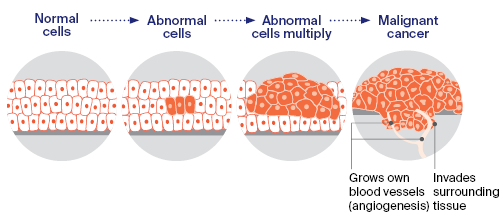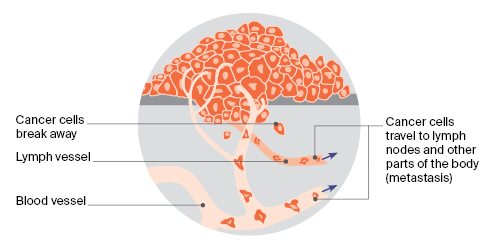- Home
- About Cancer
- Understanding cancer
- What is cancer?
What is cancer?
Cancer is a disease of the cells. Cells are the body’s basic building blocks – they make up tissues and organs. The body constantly makes new cells to help us grow, replace worn-out tissue and heal injuries.
How cancer starts
Normally, cells multiply and die in an orderly way, so that each new cell replaces one lost. Sometimes, however, cells become abnormal and keep growing. In solid cancers, such as breast cancer, the abnormal cells form a mass or lump called a tumour. In some cancers, such as leukaemia, the abnormal cells build up in the blood.

Not all tumours are cancer. Benign tumours tend to grow slowly and usually don’t move into other parts of the body or turn into cancer. Cancerous tumours, also known as malignant tumours, have the potential to spread. They may invade nearby tissue, destroying normal cells. The cancer cells can break away and travel through the bloodstream or lymph vessels to other parts of the body.
The cancer that first develops is called the primary cancer. It is considered localised cancer if it has not spread to other parts of the body.
How cancer spreads
If the primary cancer cells grow and form another tumour at a new site, it is called a secondary cancer or metastasis. A metastasis keeps the name of the original cancer. For example, pancreatic cancer that has spread to the liver is called metastatic pancreatic cancer, even though the main symptoms may be coming from the liver.

Need to talk?
Support services
Coping with cancer?
Speak to a health professional or to someone who has been there, or find a support group or forum
Cancer Council Online Community
A community forum – a safe place to share stories, get tips and connect with people who understand
Cancer information
Dealing with the diagnosis
Common reactions to a cancer diagnosis and how to find hope
View our publications
Guides and fact sheets for people with cancer, their families and friends